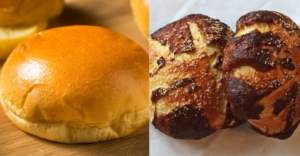All Purpose Flour Vs Self Rising Flour: Which One Is More Affordable?
What To Know
- Self-rising flour is a convenient flour that eliminates the need for adding baking powder and salt to your recipes.
- All-purpose flour is versatile and can be used in a variety of baked goods, while self-rising flour is best suited for quick breads, biscuits, and other recipes that do not require additional leavening agents.
- The pre-measured baking powder in self-rising flour ensures a consistent rise in muffins, resulting in tender and moist treats.
When it comes to baking, flour is the cornerstone ingredient that dictates the texture, rise, and overall success of your creations. Understanding the differences between all-purpose flour and self-rising flour is crucial for achieving the desired results in your baked goods. This comprehensive guide will delve into the characteristics, uses, and substitutions of these two flour types, empowering you to make informed decisions in your baking adventures.
What is All-Purpose Flour?
All-purpose flour, as its name suggests, is a versatile flour that can be used for a wide range of baking applications. It contains a blend of hard and soft wheat, resulting in a moderate protein content (typically 10-12%). This protein content provides a balanced structure and texture, making it suitable for various baked goods, including cookies, cakes, breads, and pastries.
What is Self-Rising Flour?
Self-rising flour is a convenient flour that eliminates the need for adding baking powder and salt to your recipes. It contains all-purpose flour, baking powder, and salt in pre-measured proportions. The baking powder provides a leavening agent, causing the dough or batter to rise during baking. Self-rising flour is commonly used in quick breads, biscuits, muffins, and pancakes.
Key Differences
- Protein Content: All-purpose flour has a protein content of 10-12%, while self-rising flour typically has a slightly lower protein content of 8-10%.
- Leavening Agents: All-purpose flour requires the addition of baking powder or yeast as leavening agents, while self-rising flour already contains baking powder.
- Salt Content: Self-rising flour includes salt, while all-purpose flour does not.
- Uses: All-purpose flour is versatile and can be used in a variety of baked goods, while self-rising flour is best suited for quick breads, biscuits, and other recipes that do not require additional leavening agents.
When to Use All-Purpose Flour
- Yeast-Based Breads: All-purpose flour is the preferred choice for breads that rely on yeast for leavening, such as sourdough, French bread, and dinner rolls.
- Pastries: The moderate protein content of all-purpose flour creates a flaky and tender texture in pastries, such as croissants, puff pastry, and pie crusts.
- Cakes: All-purpose flour provides a stable structure for cakes, preventing excessive crumbling or sinking.
- Cookies: The balanced protein content of all-purpose flour results in chewy and crisp cookies, with a slightly denser texture than cookies made with cake flour.
When to Use Self-Rising Flour
- Quick Breads: Self-rising flour is ideal for quick breads, such as banana bread, zucchini bread, and cornbread, which do not require additional leavening agents.
- Biscuits: Self-rising flour creates light and fluffy biscuits with a slightly crumbly texture.
- Muffins: The pre-measured baking powder in self-rising flour ensures a consistent rise in muffins, resulting in tender and moist treats.
- Pancakes: Self-rising flour produces fluffy and airy pancakes, making it a convenient choice for quick breakfasts or weekend brunches.
Substitutions
- Substituting All-Purpose Flour for Self-Rising Flour: To substitute all-purpose flour for self-rising flour, add 1 teaspoon of baking powder and 1/2 teaspoon of salt per cup of all-purpose flour.
- Substituting Self-Rising Flour for All-Purpose Flour: To substitute self-rising flour for all-purpose flour, omit the baking powder and salt from your recipe.
In a nutshell: Flour Power Unleashed
Understanding the distinctions between all-purpose flour and self-rising flour empowers bakers with the knowledge to optimize their creations. By selecting the appropriate flour type for your recipe, you can unlock the full potential of your baked goods, achieving the desired texture, rise, and flavor. Remember, flour is the foundation of any successful baking endeavor, and choosing wisely is the key to unlocking culinary excellence.
Frequently Asked Questions
Q: Can I use self-rising flour for all baking purposes?
A: No, self-rising flour is not suitable for all baking purposes. It is specifically designed for recipes that do not require additional leavening agents, such as quick breads and biscuits.
Q: What happens if I add baking powder to self-rising flour?
A: Adding baking powder to self-rising flour can result in an excessively leavened baked good, leading to a crumbly or bitter taste. It is not recommended to add additional leavening agents to self-rising flour.
Q: Can I make my own self-rising flour?
A: Yes, you can make your own self-rising flour by adding 1 teaspoon of baking powder and 1/2 teaspoon of salt to 1 cup of all-purpose flour. Stir well to combine.
Q: How do I store all-purpose flour and self-rising flour?
A: Both all-purpose flour and self-rising flour should be stored in a cool, dry place to prevent spoilage. It is recommended to transfer flour to an airtight container or resealable bag to maintain its freshness.
Q: What is the shelf life of flour?
A: Properly stored flour can last for several months. All-purpose flour typically has a shelf life of 6-8 months, while self-rising flour has a slightly shorter shelf life of 3-4 months.
